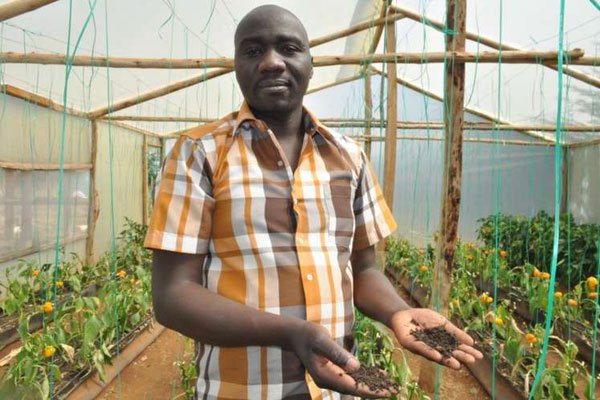David Kipchumba owns a 8 by 15m greenhouse at his home where he plants yellow capsicum.
“I plant this variety because it is in high demand,” says Kipchumba as he detaches a ripe fruit from one crop.
Beneath the lush green capsicum plants are black plastic troughs fitted with two drip irrigation pipes feeding the crop with water.
The farmer grows the crops in the troughs filled with what looks like black cotton soil.
“The growing medium is a mixture of charcoal dust, soil and dried chicken manure,” says Kipchumba, who went into farming over two years ago.
He has grown the crops in eight troughs each measuring 18 metres and holds 100 capsicum plants. A piece of the trough goes for Sh150 in agrovet shops.
FARMERS’ TRANING
The troughs and the black soil help him achieve two purposes – curb the deadly bacterial wilt and save water, especially during the dry spell.
To prepare the growing medium, he mixes 30 bags of charcoal waste, a tonne of sand soil and 30 bags of chicken manure thoroughly.
He then fills it in the troughs before planting the seedlings?
“For capsicum seedlings, I first plant them in the seedbed and, thereafter, transplant after a month. But for tomatoes, I plant directly because the transplanted seedlings are normally affected by the greenhouse heat.”
Kipchumba picked this method of farming from a farmers’ training in Eldoret in April last year.
“I met a farmer who worked at a flower farm in Naivasha and he was willing to show me. At the farm, they used it to fight soil diseases using the method,” says the farmer who once lost tomatoes he had planted in the open field on half-an-acre to bacterial wilt.
Initially, he would harvest 70 crates from the farm but this reduced to less than 50 when bacterial wilt started to attack the crops.
Bacterial wilt also attacks capsicum but ever since he adopted the technology, his crops have not been affected.
“I change the soil in the troughs after planting four different crops in different seasons. However, I was taught not to throw away the soil but use it to grow bananas because it is fertile.”
Once the plants are in their third month, he prunes them to allow new flowers to sprout resulting to new generation of capsicums fruits.
“So far I have made Sh100,000 selling the produce to Rupa Vegetables Limited and traders at Eldoret town,” says Kipchumba, 31.
“With farming, I have found financial freedom. I am now able to educate my children without any problem.”
COMPOSTED MANURE
Gilbert Kosgei, a former employee of a flower farm in Naivasha, who taught Kipchumba the farming technique, says it helps to curb bacteria wilt and other soil diseases.
“I picked the technology that I also use in my three greenhouses from the flower farm. I first tried with different planting materials in the greenhouse and the one I used with mature did well,” he says.
He has since been contracted by Techno-Serve, a non-profit business solution organisation, to construct greenhouses and teach farmers the technology.
Kosgei observes that most farmers in the region had given up on capsicum and tomato due to losses from bacteria wilt.
Prof Nancy Mungai, a soil scientist at Egerton University, agrees that the use of composted chicken manure in soils helps to battle the notorious bacteria wilt.
“Alternatively, a farmer should not plant the same crops that are susceptible to bacteria wilt for three years to prevent the disease from wiping out your crop,” says the soil expert, noting bacterial wilt is a stubborn disease.
She notes use of troughs prevents the growing medium from mixing with the infected soil in the greenhouse.








